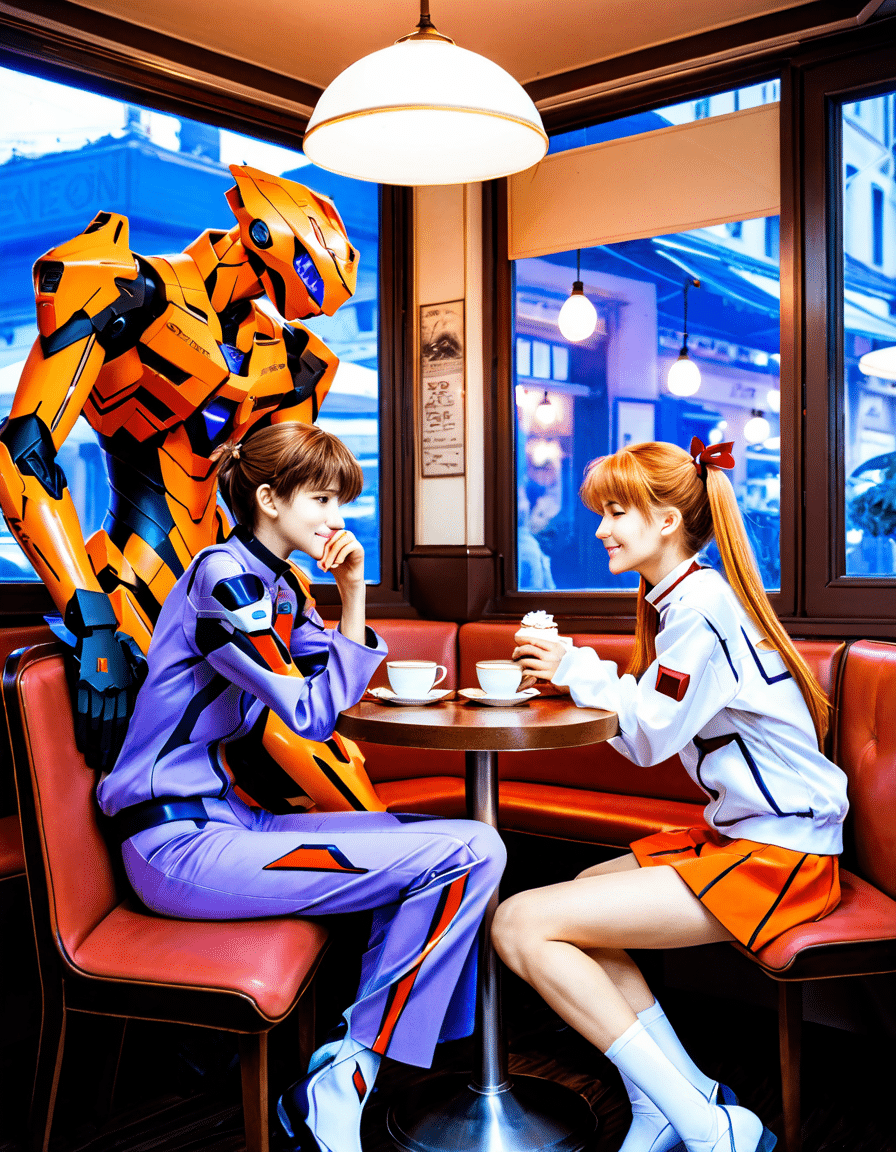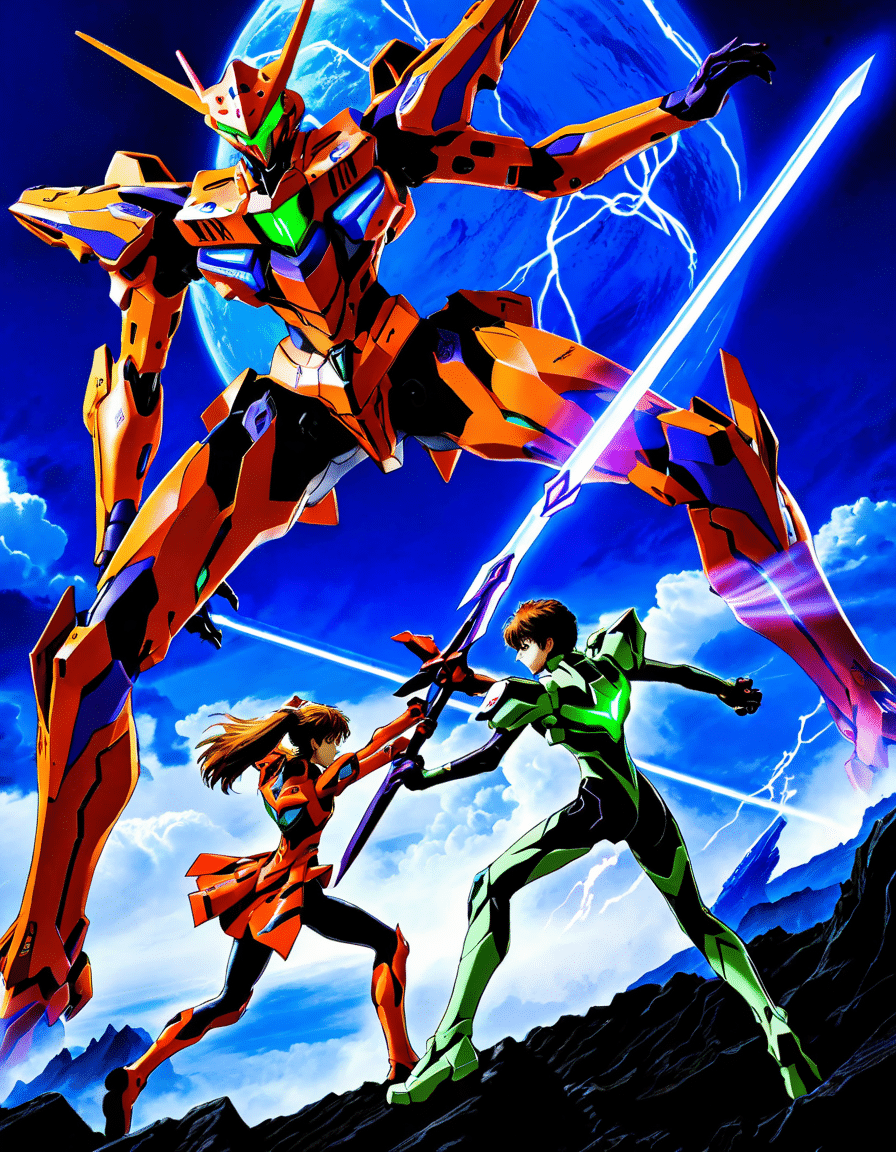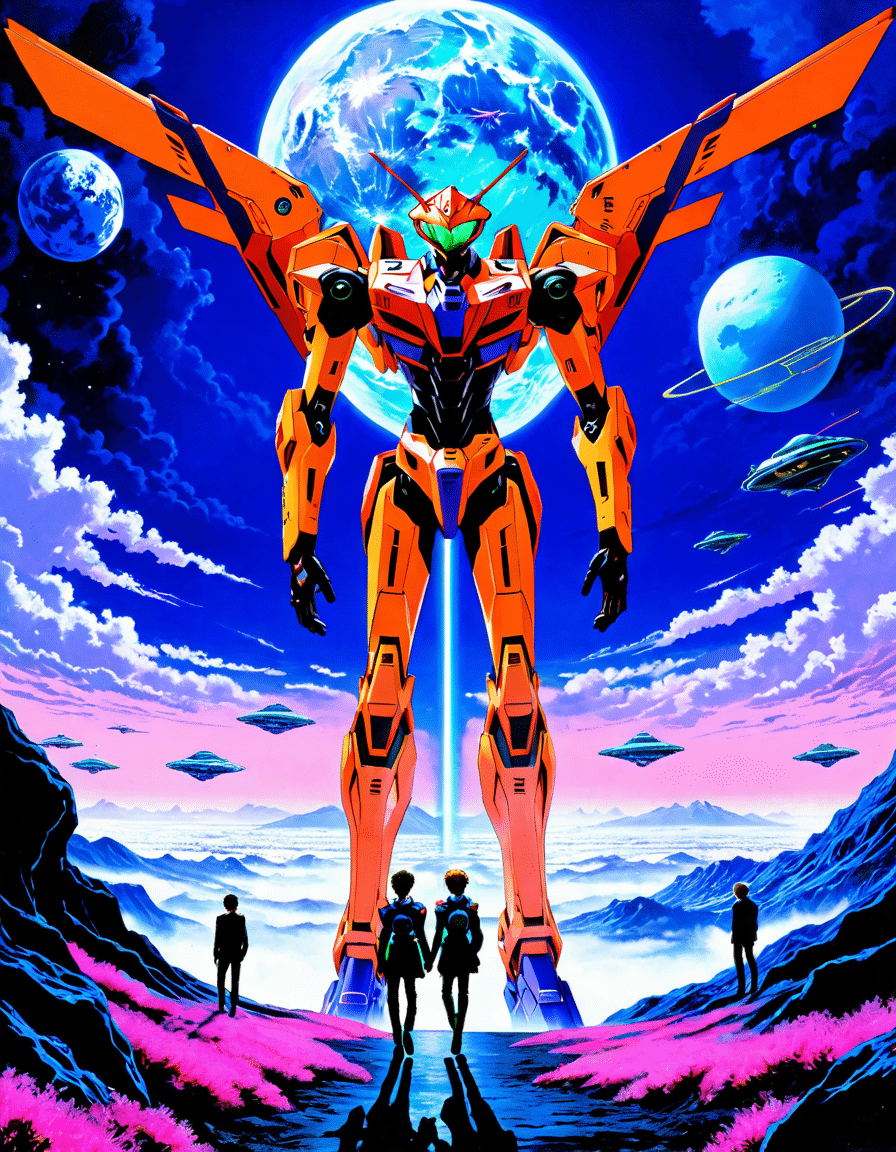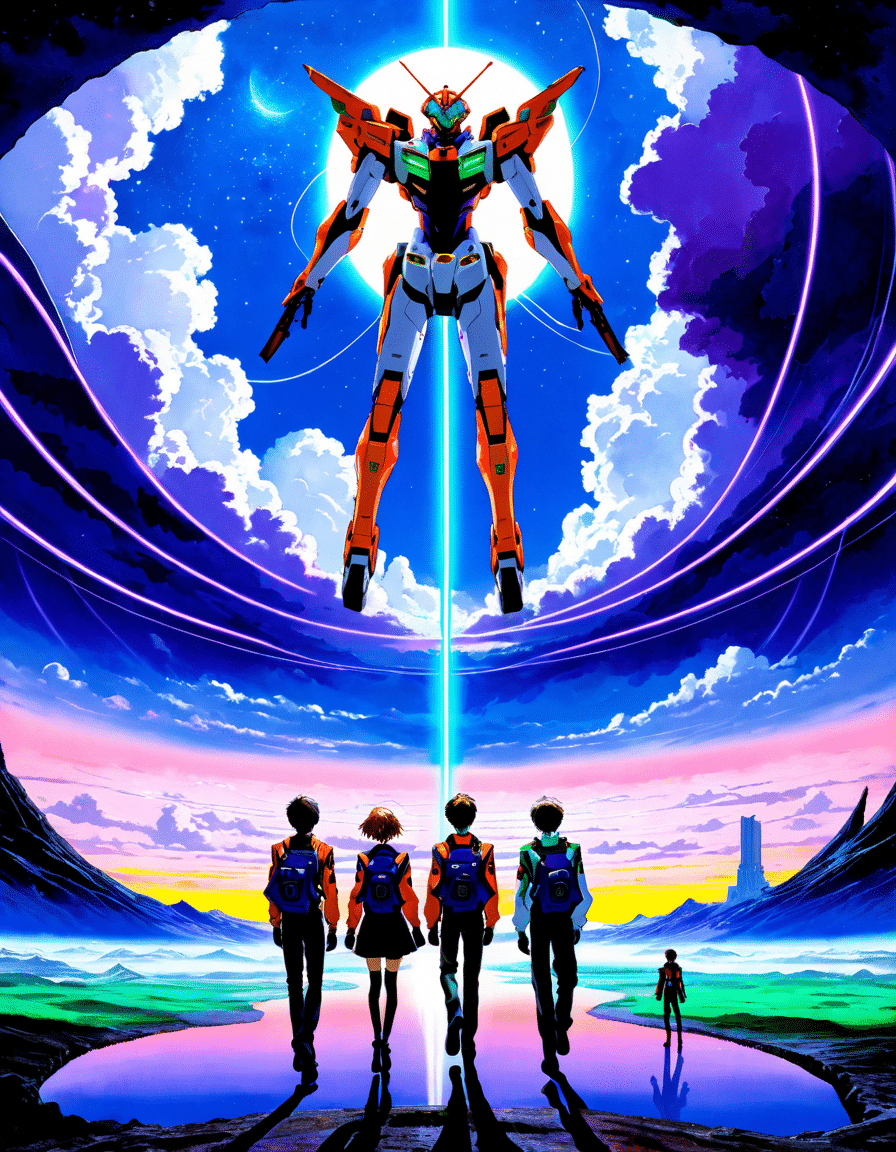
Neon Genesis Evangelion Characters Who Are The Most Iconic Heroes

Understanding the Impact of Neon Genesis Evangelion Characters on Pop Culture
“Neon Genesis Evangelion” stands as a cornerstone of anime, embedding itself in global pop culture through its deep themes, evocative storytelling, and, most importantly, its dynamic characters. Central to the series are the Neon Genesis Evangelion characters who navigate personal turmoil and existential questions. Each character serves as a vessel to explore emotional depths that resonate profoundly with audiences today. This article delves into the most iconic heroes of Neon Genesis Evangelion, examining their roles within the series and their lasting influences on both anime and broader entertainment.
The series debuted in the mid-90s, dynamically altering viewers’ perceptions of what anime could be. It tackled heavy subjects like mental health, trauma, and the intricacies of human relationships, all while entwining them with the genre’s sci-fi aesthetics. The depth of the Neon Genesis Evangelion characters invites discussions that continue to thrive in various media circles, from academia to casual fan discussions. So, let’s explore the top five heroes from “Neon Genesis Evangelion” that have made a significant mark, both in the narrative and the hearts of viewers.

The Five Most Iconic Heroes of Neon Genesis Evangelion Characters
In a landscape filled with complex personas, certain characters stand out not just for their narratives but for their embodiment of the themes like identity, existential crisis, and heroism. Here are the top five heroes from Neon Genesis Evangelion that have made a significant impact:
1. Shinji Ikari: The Reluctant Protagonist
Shinji Ikari serves as the series’ primary hero and represents the struggles of adolescence against the overwhelming weight of expectations. Throughout the series, his reluctance to pilot the EVA-01 acts as a metaphor for the search for self-identity amidst external pressures. For many fans, Shinji resonates deeply as he navigates feelings of inadequacy and confusion, something nearly everyone can relate to at some point in life.
Impact: Shinji’s portrayal of mental health has sparked discussions in both anime circles and mental health advocacy groups. His vulnerabilities challenge societal norms around masculinity and emotional expression, highlighting the importance of embracing our fears in storytelling—conversations that, frankly, are more relevant today than ever.
2. Rei Ayanami: The Enigmatic Idol
With an ethereal presence and ambiguous origins, Rei Ayanami embodies self-sacrifice and the quest for individuality. Initially perceived as cold and detached, her character develops remarkably over the series, leading to profound realizations about her humanity. This evolution invites audiences to reconsider their views on identity and the importance of personal understanding.
Impact: Rei’s transformation has influenced countless characters across subsequent series. She exemplifies the archetype of the mysterious girl with hidden warmth and has transcended her narrative, inspiring fashion trends and art that echo her aesthetic appeal. She effectively captures the shared struggle for authenticity.
3. Asuka Langley Soryu: The Fiery Challenger
Asuka Langley Soryu is a bold figure who embodies the “strong female character” trope, marked by fierceness and competitiveness. Her energetic façade hides inherent insecurities, especially in her complex interactions with Shinji. Asuka’s struggles depict the journey of self-acceptance, showcasing how pride and vulnerability can coexist.
Impact: Asuka has become a symbol of independence, inspiring a generation of female characters in anime and beyond. She encourages embracing flaws, emphasizing that strength often comes through recognition of one’s vulnerabilities. Catchphrases and her bold attitude have made her an enduring pop culture icon.
4. Misato Katsuragi: The Leader with Heart
Misato Katsuragi wears dual hats—both as a commanding officer and a nurturing friend. She represents the tumult that comes from balancing professional duties with deeply personal conflicts. Her mentorship role for younger characters like Shinji and Asuka displays the struggles many face as they try to align personal desires with overarching responsibilities.
Impact: Misato has inspired narratives featuring multifaceted women who wrestle with both leadership and vulnerability. Her relatability and courage have opened doors for character developments in both anime and Western media alike, emphasizing that the struggle is part of a larger human experience.
5. Gendo Ikari: The Foreboding Antagonist
Often viewed purely as an antagonist, Gendo Ikari complicates traditional villain archetypes. He’s a deeply flawed human being, motivated by love and grief, attempting to connect with his lost past through his son, Shinji. The complex dynamics of their relationship raise poignant questions about parental expectations.
Impact: Gendo’s character invites deep analyses around paternal relationships in media. His flaws and motivations set a precedent for how antagonists can be portrayed as more than just obstacles; they can serve as mirrors to the protagonists’ struggles.
The Lasting Legacy of Neon Genesis Evangelion Characters
The impact of these Neon Genesis Evangelion characters extends well beyond their individual stories. They serve as vessels for larger themes that resonate with audiences across the globe. The series redefined heroism, moving beyond traditional tropes into nuanced explorations of mental health and emotional struggles, inviting viewers to engage with characters on a profound level.
Years after the series first aired, these characters still spark important cultural discussions regarding identity, gender, and societal expectations. They not only reflect the growing complexity of storytelling in anime but also resonate widely with audiences in today’s world. The legacy of Shinji, Rei, Asuka, Misato, and Gendo clearly echoes through contemporary narratives, showcasing the ongoing journey of self-discovery and the complexities of human experiences.
In a landscape where anime continues to grow and diversify, the influence of Neon Genesis Evangelion characters remains a driving force. Their intricacies and contradictions have defined a generation and paved the way for new stories that challenge perceptions. As creators pen the next wave of character-driven narratives, the reflections of these iconic figures will undoubtedly shape future tales, reminding us that even heroes must grapple with their identities. If you enjoy stories filled with emotional depth, sprinkled with the struggles of real life—then check out Moana 2 on Disney Plus for a Disney take on personal growth.
Whether you’re a filmmaker, an industry professional, or just a passionate movie lover, the legacy of these characters continues to resonate. They’re a testament to the art of storytelling, showcasing that vulnerability can be as powerful as strength.
Neon Genesis Evangelion Characters: Fun Trivia and Interesting Facts
The Magical Duo of Misato and Shinji
Did you know that Misato Katsuragi, one of the most memorable neon genesis evangelion characters, has a knack for balancing her responsibilities as a military strategist while enjoying life? This duality is perfectly captured during her carefree adventures, which mirror elements found in stories like 16 And Pregnant. This show, much like Misato’s life, explores the juxtaposition of heavy responsibility and youthful exuberance.
Shinji Ikari, the reluctant hero, is often seen grappling with his self-worth, much like the emotional turmoil depicted in Moana 2 Disney Plus, where characters come face-to-face with their identities. What’s fascinating is how Shinji’s struggles to pilot the EVA reflect a deeper existential quest, making him relatable to fans from all walks of life. So, whether you’re rooting for Misato’s fun-loving spirit or wrestling with Shinji’s self-doubt, these characters resonate on many levels.
Iconic Anti-Heroes: Gendo and Rei
Then there’s Gendo Ikari, whose cold demeanor hides layers of complexity. He’s often compared to characters like John Larroquette in terms of depth but is much more twisted with his needs and motivations. Gendo’s sacrifices make him one of the most intriguing neon genesis evangelion characters, and the journey he takes can make any viewer contemplate the price of ambition.
Rei Ayanami, on the other hand, is a character that prompts conversations about identity and transformation, akin to the conversations sparked on the Gaypage about embracing one’s true self. Rei’s enigmatic nature and connection to Gendo provide viewers with a mosaic of themes surrounding love and loyalty. And let’s not forget the moments that fans enjoy discussing; the layered storylines keep audiences coming back for more, just like how Hyunjin from Stray Kids captivates his followers.
The Lasting Impact of Evangelion’s Heroes
What’s remarkable about these neon genesis evangelion characters is how they echo into contemporary pop culture. For instance, the emotional weight carried by these characters has made them staples in fan discussions worldwide, inspiring memes and references as far as Kate Middleton And Prince william are Holidaying at Balmoral. Just as those royal moments get analyzed, the subtle nuances of Rei, Shinji, and Misato continue to ignite the imaginations of fans of all ages.
Moreover, their multifaceted personas draw comparisons to sports teams like Deportivo Cali, reflecting the passion and dedication fans have toward lesser-known icons. The themes of struggle, resilience, and connection that run through the series are timeless, ensuring that discussions around these neon genesis evangelion characters will persist as new generations discover their stories. So, dive deep into their worlds, and let these iconic heroes guide you through the rich landscapes of emotion and conflict.










